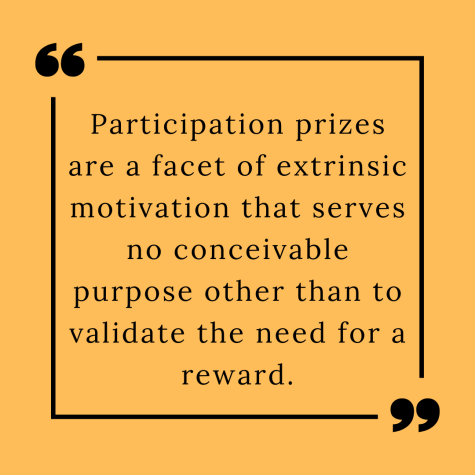Passionless Participation
A nuanced look at how participation prizes perpetuate a culture of extrinsic motivation
Doing something for the sake of getting a prize prevents us from pursuing our true passions. Photo Illustration|Meggie Chen
October 14, 2022
I’ve been playing piano for as long as I can remember. With my previous teacher, I distinctly recall the little ritual we’d have at the end of our piano recitals. After we’d all taken our bows and been smooshed together for the parental paparazzi to descend on us like a flock of starved vultures, we’d each receive a little plastic trophy for our “hard work.” In simpler words, a participation prize.
At first I was thrilled, as any 10-year-old child would be with receiving something that inflates their ego. However, as the years passed, I found myself enjoying piano less and less. I got to the point where I’d rather sit on the piano bench, debating for 30 minutes whether I truly wanted to practice, then do something actually useful with my time. It wasn’t until I changed teachers to my current one, with whom I received absolutely nothing for playing at a recital (besides the feeling of wild fear that happens when your sweaty fingers begin to slip off the keys), that I began to find myself looking forward to playing again. It seems counter intuitive, right?
Often a highly debated topic, participation prizes have been the subject of scrutiny, with many who deem them unnecessary. It’s important to note, however, that participation prizes can be important at times. For example, in the case of younger children, it is usually advised to reward participation because they don’t yet have the maturity to grasp the nuances of losing and winning.
The real problem doesn’t lie with participation prizes as a concept, but rather in the culture of extrinsic motivation that they perpetuate. According to Healthline, extrinsic motivation is defined as “reward-driven behavior,” while intrinsic motivation is defined as doing something for “personal satisfaction or enjoyment.” Studies have shown that people motivated by extrinsic motivation tend to underperform in comparison to those who aren’t. For example, it was demonstrated that out of a group of children who were drawing, those offered a reward for doing it were less creative than those who weren’t.

To be perfectly clear: there will always be a culture of extrinsic motivation. There has to be. If everyone only participated in activities they enjoyed, no one would accomplish anything. However, participation prizes are a facet of extrinsic motivation that serves no conceivable purpose other than to validate the need for a reward. But you don’t and shouldn’t need some sort of trophy or award to feel good about yourself, and the fact of the matter is you won’t always feel good about yourself after competitions anyways.
And that’s OK.
The value of winning and losing doesn’t come from the validation, but rather what you glean from the experience. It might sound cliché, but many still fail to internalize it. Despite the emphasis society seems to put on the benefits of losing, we won’t truly understand it until we experience it ourselves, which is exactly what participation prizes prevent.
Especially in a school as academically focused as MVHS, the reliance on extrinsic motivation is an issue. As much as we pride ourselves on our straight-A report cards and USACO gold medals (not to mention our ability to ingest unholy amounts of caffeine), it’s also important to stop once in a while and consider whether the path you’re pursuing is one that you actually enjoy. If you only pursue what will yield the most reward, the most money, rather than what you love, all you have left is putting work into something you’re not passionate about. After all, your academic achievements won’t mean as much later on in your life if you’re stuck in a job you hate.
Of course, it’s always easier said than done, but you have to start somewhere. So, if you find you cannot muster up a drop of motivation for a certain subject, or if you’re participating in a club purely to get that participation prize and putting it on your college resume, perhaps ease off a bit. Tell your club leader you need a bit of a break and need a week or two off. Focus less on trying to complete that bit of code you can’t figure out and more on your literature essay. Or even just spend that time to go outside and touch some grass (God knows we all need to). If you find that you really do want or need to continue the activity, you can continue no harm done. And if you find that stopping does not mean that you will be smitten by God from the heavens above, then quit.
After all, life’s too short to waste chasing after some unsustainable pipe dream for the sake of a cheap piece of plastic or one line of text to slap on your college application. Take a step back. Find something you truly enjoy. And for our continued pursuit of passion, let’s stop giving out participation prizes.


















